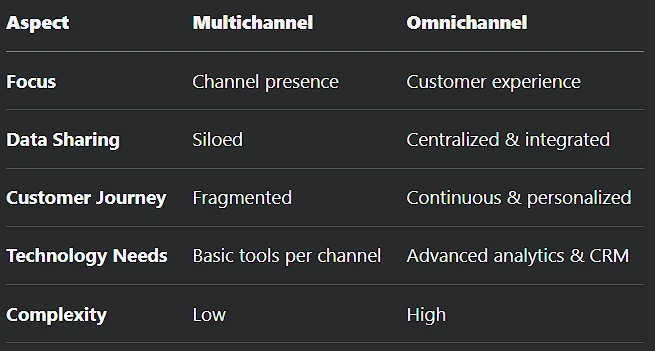Introduction
As a business operating in a fragmented digital landscape, businesses often struggle to choose between “omnichannel” and “multichannel” strategies. While both involve engaging customers across multiple platforms, their execution and impact differ dramatically.
Hence, leading Salesforce marketing cloud consultants - Cymetrix with their deep expertise in Marketing automation to shed more light on these approaches, explore their pros and cons, and identify which aligns best with your business goals.
Defining the Basics
Multichannel Marketing: Uses multiple independent channels (e.g., email, social media, SMS, physical stores) to reach audiences. Each channel operates in isolation, with minimal coordination.
Omnichannel Marketing: Integrates all channels into a unified, cohesive experience. Customer interactions are synchronized, with data shared seamlessly across touchpoints.
Omnichannel vs Multichannel Marketing - while no single strategy is better than the other, the one you choose would depend on your business goals, budget and a lot more. Let’s take a look in more detail.
Key Differences at a Glance

Diving Deeper: How They Work?
1. Strategy & Customer Experience
Multichannel prioritizes visibility. A retail brand might run email campaigns, social ads, and in-store promotions simultaneously but without linking these efforts. For example, a customer who clicks a Facebook ad might receive unrelated email offers, creating a disjointed experience.
Whereas, Omnichannel centers on continuity. Using the same retail example, a customer who browses products online could later receive personalized email reminders, in-store recommendations via a mobile app, and post-purchase follow-up SMS—all reflecting their unique behavior.
2. Data & Personalization
Multichannel strategies often lack shared data, leading to generic messaging. A bank using multichannel might send the same loan offer via email, SMS, and direct mail, ignoring a customer’s prior interactions with its website.
Omnichannel relies on unified data platforms (like CDPs) to track interactions. If a user abandons a cart on a mobile app, the system triggers a tailored email with the saved items and an SMS discount code, creating a sense of “being known” across channels.
3. Operational Demands
Multichannel is simpler to implement. Small businesses can manage separate campaigns for Instagram, email, and Google Ads with minimal coordination. However, this often leads to inconsistent branding and missed cross-sell opportunities.
Omnichannel requires robust infrastructure. Tools like Salesforce Marketing Cloud or HubSpot unify data, automate workflows, and enable real-time adjustments. For instance, a travel agency using omnichannel could adjust its social ad bids based on real-time email engagement metrics.
Pros and Cons
Multichannel Marketing
Pros:
- Low cost and easy to launch.
- Broad reach across diverse audiences.
- Ideal for businesses testing new channels.
Cons:
- Inconsistent messaging risks customer confusion.
- Limited ability to track cross-channel behavior.
- Lower ROI due to duplication and poor targeting.
Omnichannel Marketing
Pros:
- Higher customer retention.
- Personalized experiences boost conversion rates.
- Data-driven insights refine long-term strategies.
Cons:
- Expensive to implement and maintain.
- Demands skilled teams and advanced tech stack.
- Over-automation can feel impersonal if poorly executed.
Which Approach Fits Your Business?
Choose Multichannel If:
- You’re a startup or SMB with limited resources.
- Your audience engages on 1–2 primary channels.
- Your goal is broad awareness, not deep personalization.
Opt for Omnichannel If:
- You have the budget and tech to unify data.
- Customer lifetime value is a top priority.
- You operate in competitive industries (e.g., retail, finance, SaaS).
Conclusion
While Omnichannel marketing strategy might seem like a better option, but that’s not always the case, limited resources, niched audience, or if your goal is not deep personalization, multichannel might be the choice you’re looking for.
But, if you’re struggling to figure out the right approach or having trouble implementing the right plan/strategy, don’t hesitate to get in touch with our Marketing Automation Consultants at Cymetrix.


